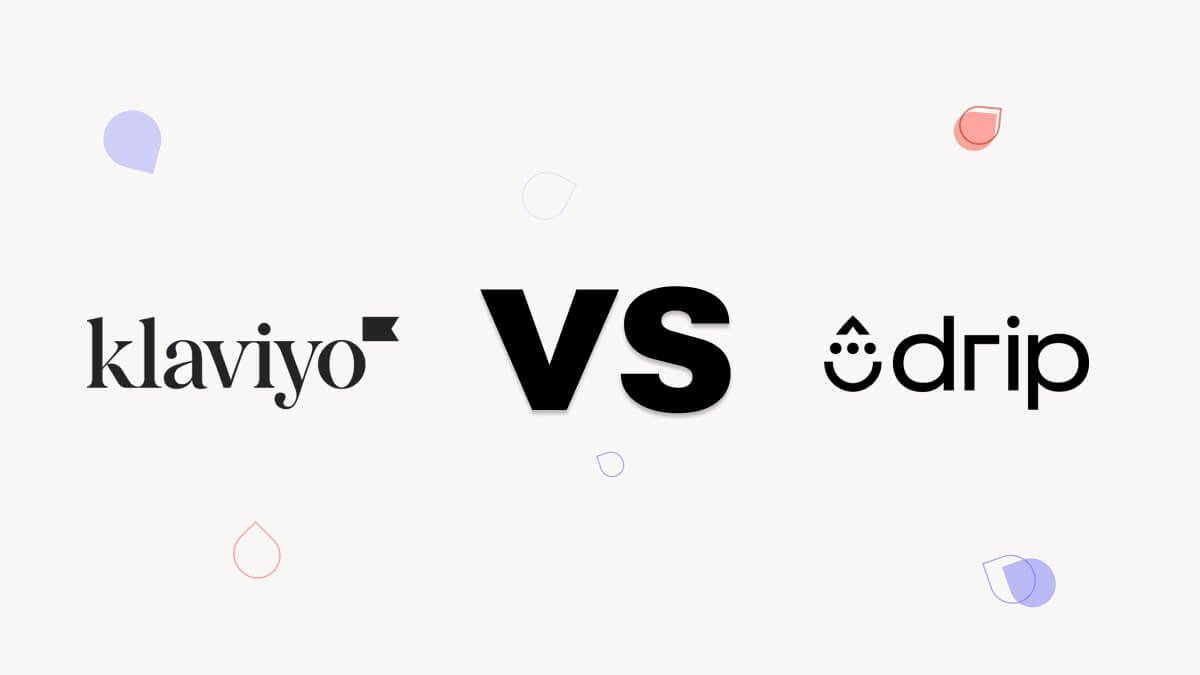Klaviyo vs Drip for eCommerce: Which One Is Best for Your Online Store?
Here's the Ultimate Comparison between Klaviyo and Drip. Learn which one is better for your eCommerce store. We cover segmentation, design, pricing, and more.
Updated November 6, 2024.

As of 2018, Drip started to market itself as an eCommerce marketing tool to compete with everyone’s favorite eComm email tool: Klaviyo. And there’s been a lot of talk about how they compare, and which one is better.
So are the two on a direct collision course, or is it more of an “I go my way, you go yours” marketing song we’re collectively witnessing right now? Should you move to Drip if you’re on Klaviyo – or pick Drip over Klaviyo if you’re on any of the other email software out there?
For this article, we dug out our Sherlock Marcomms outfit and took a closer look at Drip and Klaviyo as email marketing tools for eCommerce.
Read on if you want to learn which one’s the best for your online store.
Key Takeaways
- Drip is a tag-based system and Klaviyo is a list-based system
- Klaviyo is built for eCommerce - it shows you how customers respond to campaigns, purchase history, and the items they viewed in the store.
- Klaviyo has more advanced segmentation capabilities because it integrates with third-party data.
- Drip is a good option if you’re looking for a good automation tool that checks all the boxes and has all the basic features.
- Klaviyo is a much better option if you want to build omnichannel campaigns and increase your customer lifetime value.
Klaviyo vs Drip: the general comparison
At a glance, Klaviyo and Drip look very similar. They're both email service providers (ESPs) and market themselves as eCommerce-friendly.
Both platforms come with beautiful email templates, workflow and campaign automation, and personalization capabilities. And both of them provide advanced analytics and have similar pricing plans.
Yet, if you're running an eCommerce business, Klaviyo’s email marketing platform might be the better choice.
Here's why.
Key features breakdown
Although Drip now markets itself as an eCommerce marketing tool, Klaviyo continues to be a top choice for most eCommerce marketers – and for all the right reasons.
To assess whether Drip has gained an edge over Klaviyo for eCommerce businesses, we looked at seven key features:
- Integrations
- Modern email templates and editor
- Personalization and smart segmentation
- Marketing automation features
- A/B Testing
- Analytics
- Pricing
Here's what we found out.
Klaviyo vs Drip: integrations
Email tools need to be properly integrated with other services and platforms, and there's no way around it. Without integrations, email marketing works in a silo, and fails to deliver on its promise.
To make the most out of your marketing efforts, you need to make sure your ESP integrates with your eCommerce platform. And Klaviyo does that, as it connects to all major eCommerce platforms.
- Shopify
- BigCommerce
- Magento
- Opencart
- WooCommerce
- ...and more.
To maximize efficiency and productivity, you want your email software to connect to other tools as well. For instance, you should consider integrations with Google Analytics, Facebook Ads, or project management software.
In this regard, both Klaviyo and Drip stand on equal grounds, with more than 250 one-click integrations available on both ends. Yet, Drip seems to have fewer direct integrations (as many of them work through Zapier, not through the ESP itself). For example, Drip doesn’t integrate with Wxi, PrestaShop, Gorgias, Recharge, or Okendo, but Klaviyo does.
The Winner: Klaviyo, because it has more native integrations to eCommerce platforms and tools.
Starting to feel that your Klaviyo agency or expert you’re working with has been right all along? Wait till you read the next point.
Klaviyo vs Drip: email templates and editor
Email templates are a huge element of any email builder. You want your email sends to look good, maintain brand consistency, and still provide enough flexibility for creative customization.
Klaviyo's email design editor is incredibly intuitive, and its drag-and-drop features make it easy to customize your emails. The tool also enables you to see how emails will look from the perspective of any contact in your list, on mobile or desktop devices.
Drip's email template editor is slightly different. Instead of being a drag-and-drop editor (like Klaviyo’s), it's a point-and-click one, which might take some getting used to. Drip offers beautiful email templates and device-based pre-send testing too, in ways that are similar to Klaviyo.
However, you might feel like you have less control over your email designs in Drip than you do in Klaviyo. Combined with the lack of drag-and-drop functionality, this means that customizing your designs might take more time in Drip than it would in Klaviyo.
The Winner: both Drip and Klaviyo do quite well in the email design and templates area. Still, most users will likely feel that Klaviyo is easier to use and customize.
Klaviyo vs Drip: sending personalized emails to specific segments
Segmentation is key for email marketing - as it allows you to group your email contacts and deliver more relevant emails, better suited to their interests. Think of it this way: without proper segmentation, emails feel like we're back in 2005, sending random mass messages to everyone in our email list.
When you segment your audience and personalize your communication, each email becomes a real conversation.
Both Klaviyo and Drip allow you to segment and personalize your lead-nurturing emails. And yet, Klaviyo shines through as the most segmentation-friendly platform, as it enables you to:
- Understand the data for each contact in your email list including the items they viewed in your store, their AOV, and their activity online.
- Create and save lists and segments on virtually any criteria, then send personalized drip campaigns, link with a Facebook audience, or look at the engagement quality of each segment.
- Personalize each email (the bread and butter for every Klaviyo expert)
On the other hand, Drip is a tag-based system (while Klaviyo is a list-based one.) This means that adding dynamic content blocks is easier in Drip and helps you create more advanced personalizations (such as including weather information, making cross-sell recommendations, or even adding dynamic pricing to your emails).
The main differences between Drip and Klaviyo are:
- Access to data and personalization is a bit more complicated in Drip, as Drip doesn’t work with “lists”, but with “users.” In other words, Drip sees each contact in your database as an individual, and doesn’t automatically group contacts based on the criteria you need it to (like Klaviyo does.)
- Klaviyo’s predictive analytics can also help you build automated segments based on previous behavior – which Drip doesn’t allow.
- Drip doesn't connect to external data (which Klaviyo does.) For example, Klaviyo can import your Facebook audience data, which means you can build integrated, omnichannel marketing campaigns to target potential and existing customers on Facebook too – and you can do it according to where in the buyer’s journey they are.
These differences don't seem like much, but for eCommerce businesses, they might tip the scales.
In the end, although Klaviyo and Drip provide a pretty advanced level of segmentation and personalization, Klaviyo is ahead on this one.
The segmentation capabilities Klaviyo offers are far superior due to its connection to external data sources (like Facebook, for example), its ability to build automated segments and to even predict new segments that will make your email marketing more efficient.
The Winner: Klaviyo
Klaviyo vs Drip: email automation
Email automation enables you to set up automatic sequences based on customer behavior. It's like having an extra team member to help you send emails and manage user data.
Klaviyo calls its automation sequences "flows". You can schedule campaigns with time delays and set up custom triggers based on various conditions.
With Klaviyo’s email marketing software, you can:
- Showcase different product categories
- Show related products or recommend items
- Trigger entire campaigns based on customer behavior
On top of everything, Klaviyo also provides you with automation templates, all created especially for the eCommerce industry.
Here's the thing.
Drip’s automations do the same thing as those of Klaviyo. It allows you to create workflows and because it's a tag-based system, many even consider it more flexible than Klaviyo.
Drip's entire workflow section is user-friendly and efficient. They have fewer automation templates, but, depending on what type of email marketer you are, you might find that they're enough.
Where Klaviyo excels on the automation side is the abundance of data they provide. The more data you have, the more segmented and personalized your automation will be.
When you have a lot of information to work with, you can create smaller, more efficient segments for your communications – and thus make your messages clearer to very specific parts of your audience.
Ultimately, that's a huge leverage for an eCommerce email marketer.
To summarize, both Klaviyo and Drip are great options for automation. But if you want to look at automation beyond pure functionality Klaviyo might be a better option (precisely because it offers more data so you can build better automations.)
The Winner: Klaviyo
Klaviyo vs Drip: A/B testing
If you don’t A/B test, you’ll never know what works and what doesn't.
Klaviyo allows you to run A/B tests easily - and as in-depth as you need it. You can test email subject lines, content, as well as different branches within a flow (to see which timing, offers, or content do best.)
Drip has an A/B tests feature as well, but it only allows you to test your emails' subject lines - a HUGE disadvantage when compared to Klaviyo.
The Winner: on the A/B testing battlefield, Klaviyo wins by a mile.
Klaviyo vs Drip: data analytics
Data makes the world go round - and it’s absolutely required for email marketers to do their job.
Both Klaviyo and Drip will provide you with data analytics. The difference is that Klaviyo enables you to sync your data with external sources like Google Analytics. This opens up a whole world of data for analyzing customer behavior, which can help you make better decisions about what content and offers you should send out.
Also, Klaviyo's dashboard is completely customizable. You can create your own data reports with all the information you need and then display them on your dashboard.
Drip's dashboards are a lot more simplistic. You will still get basic information on your campaigns, but it will not be as in-depth as Klaviyo's.
The Winner: If you want the basics, Drip will do just fine. But if you want more advanced data analytics, Klaviyo is the better choice.
Klaviyo vs Drip: pricing
Both Klaviyo and Drip are attractive choices for eCommerce companies. Which one's more cost-effective, though?
Drip doesn't have a free pricing plan, but you can get their 14-day- trial period if you want to test the tool.
If you have 2,500 email addresses in your subscriber list, Drip will cost you $39 per month with unlimited email sends, support, and free migration included.
For the same subscriber count, Klaviyo will cost you $60 per month with all their advanced features, 25,000 monthly email sends, and chat & email support.
Plus, if you want to send conversational SMS messages you can upgrade from the basic plan to the premium plan for $70 and get 2,500 SMS credits. And if you want to test Klaviyo out, they have a free plan for up to 500 subscribers.
All in all, Klaviyo is more expensive than Drip - but it also comes with more features suitable for online stores (as well as SMS marketing). Klaviyo is specifically built for Shopify stores so if you run on Shopify then it’s by far the best tool to use.
Otherwise, if you just need the basics, Drip is your way to go. If you want to full arsenal (in-depth segmentation, data analysis, drag-and-drop interface) Klaviyo is a better choice.
The Winner: Drip is cheaper, but it’s more basic.
Our recommendation
If you're running an eCommerce shop, Klaviyo is the best option, by far. The segmentation options, the data Klaviyo pulls and helps you use, and, overall, how this tool functions - will all bring your email marketing efforts to a new level.
And if you're looking for an email marketing agency or email consultant to help you make the most of this tool, you can rest assured there are plenty of options for you.
If you're running a blog, or you're a content creator and you don't need that much data, nor do you send a lot of transactional emails, Drip might be a better choice.
It's a solid email marketing app with plenty of beautiful email templates and options for personalization - and for those more advanced of you, the entire tag-based contact management system will be a treat.





